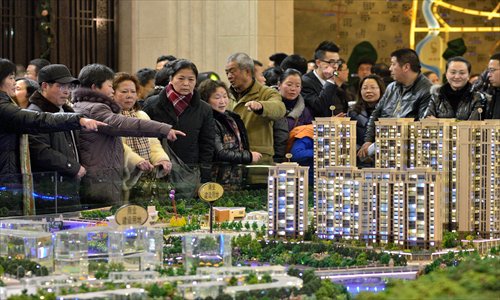Property rules not working: analysts

Potential homebuyers crowd around a property project model in Guiyang, capital of Southwest China's Guizhou Province on Saturday. Photo: CFP
China's so-called "national five rules," which had been implemented for a year as of Thursday, appear to have failed to curb the rise in home prices and cool down the property market, analysts said.
The five rules, which were released by the State Council on February 20, 2013, came after a sharp rise in home prices in the second half of 2012 and were seen as the toughest national regulations that had been issued by the central government in years.
The rules require the authorities to suppress speculative buying, increase land supply for housing and speed up the construction of affordable housing projects.
Many homebuyers and analysts had high expectations for the rules, hoping they would rein in the soaring property prices, especially in first-tier cities such as Beijing and Shanghai.
However, out of the 70 major cities tracked by the National Bureau of Statistics (NBS), only one city - Wenzhou in East China's Zhejiang Province - saw its new house prices fall in 2013.
The price of a new home in seven of the cities rose by more than 15 percent last year, according to the NBS data. Shanghai prices rose the most, with a gain of 21.9 percent.
Hui Jianqiang, research director at real estate information provider Beijing Zhongfangyanxie Technology Service Co, told the Global Times Thursday that the five rules sounded "tough" but were not fully implemented, especially in less developed regions.
"The five rules require the government to put tighter controls on the housing market, which is contradictory to the current leadership's general policy of letting the market play the decisive role," Hui said. "That was partly why the central and local authorities refrained from carrying out the rules strictly last year."
Chen Guoqiang, deputy head of the China Real Estate Society, told the Global Times Thursday that although the five rules did not stop the surge in home prices, it facilitated the construction of affordable homes and increased the supply of land for housing.
"The public should view the effects of the five rules in a more comprehensive way," Chen said. "In general, it had some positive effects on the housing market."
There has been criticism of the high home prices in Beijing, but media reports in September said the municipal government had vowed to provide 20,000 units of government-subsidized affordable apartments for households with limited income in 2013.
These apartments share the property rights with the government and the homes cannot be resold within five years.
The city started accepting applications on Saturday to purchase homes in its second and third phase of such housing projects, which contain a total of 5,347 apartment units, and more than 219,000 people had handed in applications for the second phase as of late Tuesday, according to soufun.com.
The local government of Beijing pledged late last year to provide 50,000 such apartment units in 2014, financial news portal caijing.com reported in January.
Hui said that local governments will have to ensure that they provide "a decent amount" of affordable housing before the housing sector becomes more market-oriented, something that will be an inevitable trend, Hui said.
"Home prices will drop in the long run. As China's population ages and seniors pass away, young homeowners will own two to three homes on average, and that will increase the supply in the housing market," he noted.